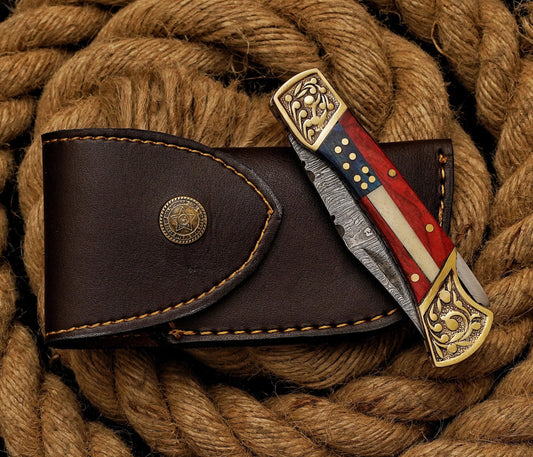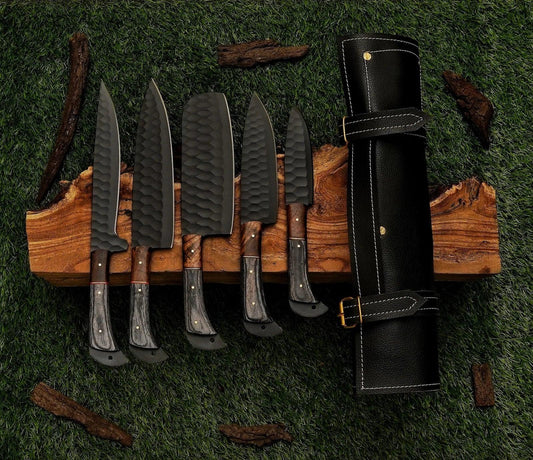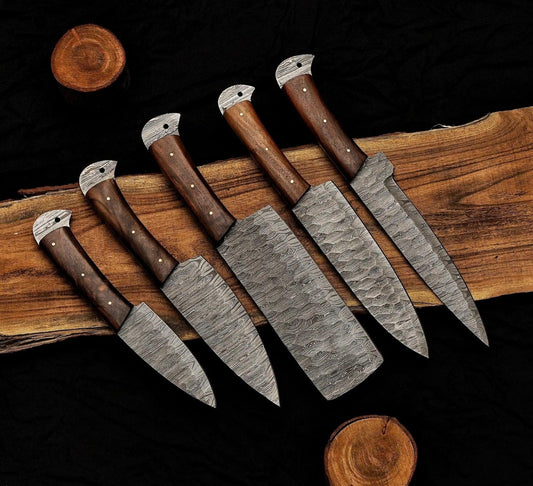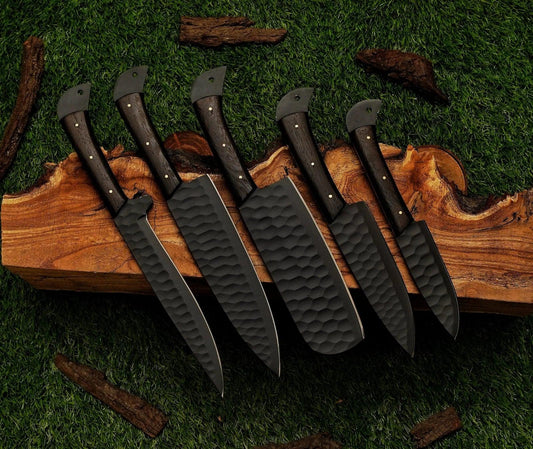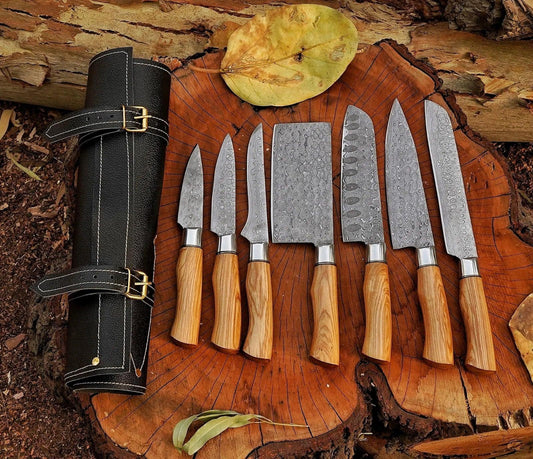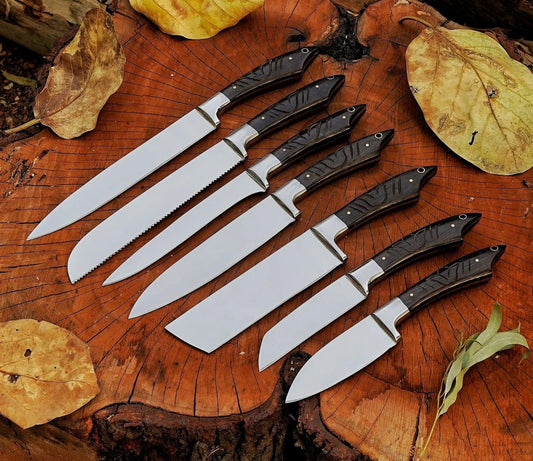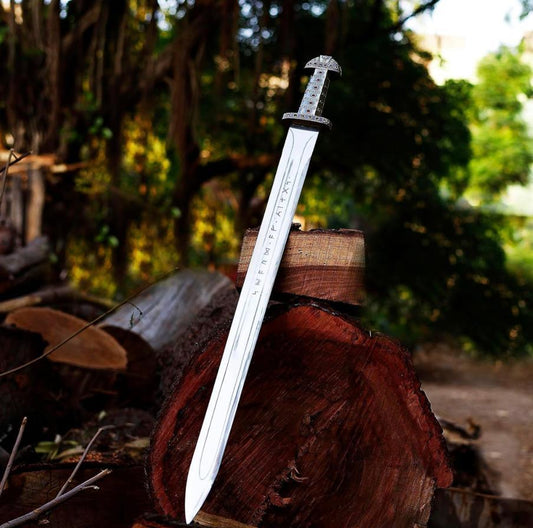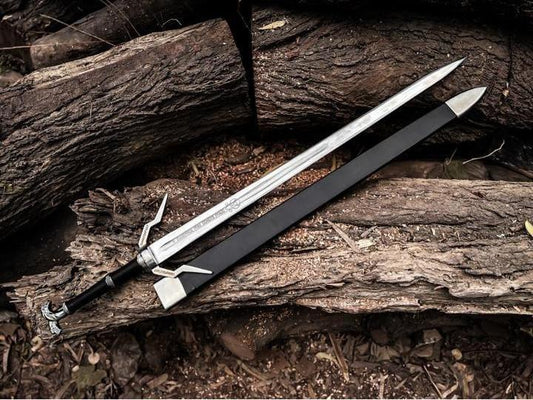Knife Care Instructions
Instructions
- These Knives are only intended to be used for Cutting Food.
- Knives should be kept out of the reach of children.
- knives should only be used by adult or used the supervision of one.
- Maintain a clear, clutter-free workspace to reduce the risk of accidents while using your knife.
Steel Knife Care Instructions
Damascus steel possesses a high carbon content, contributing to its durable cutting edge. However, this carbon content renders it prone to rust when exposed to moisture. To prevent corrosion, it is advised to clean your knives using warm water and standard dish soap, followed by thorough drying with a clean towel. Once dry, apply a light coat of oil using a cloth or paper towel. Mineral Oil is recommended for its affordability, food safety, and resistance to spoiling. While any cooking oil can serve as a short-term alternative for Carbon Steel Knife Care, it is not recommended for prolonged storage due to its potential for spoilage.
CARE INSTRUCTIONS
Before Use
- You need to wipe down blade with a clean, soft cloth after you receive it.
- Please clean and dry the blade after using and keep it at the dry place.
- Always use vegetables , White oil, Or Coconut oil an put on the blade to avoid rust.
- Don’t store the knives in leather sheath for long period of time.
- Avoide using the knife on bones or frozen foods, as this can chip or damage the blade.
- Hand wash knives with warm, soapy water and dry immediately to prevent rust and corrosion.
- Avoide putting knives in the dishwasher as harsh detergents and high heat can damage them.
- Store Knives in a knife block, magnetic strip, or blade guard to protect the edge and prevent accidents.
- Use soft cutting boards like wood or plastic to prvent dulling the blade.
- Avoid hard surface like glass or ceramic.
If your knife develops rust, there's no need for concern as it can be easily remedied.
Rust can develop quickly on a freshly exposed blade, which may initially be concerning. However, there are effective steps to address this issue. Should rust appear, carefully cleanse the blade with apple cider vinegar or lemon juice, followed by thorough washing with warm, soapy water. After drying by hand, proceed to apply a light coat of oil as part of regular maintenance. Over time, your knife will develop a protective patina, enhancing its resilience against moisture. While High Carbon Damascus steel demands more attentive care compared to conventional kitchen knives, its exceptional quality, performance, and overall user satisfaction make this effort highly worthwhile.
- Clean knives in warm, soapy water and dry them immediately.
- Apply mineral oil to the blade before storing to prevent corrosion.
- Remove rust with vinegar if necessary.
- Avoid prolonged storage of knives in a leather roll as it can retain moisture against the blade. If storage in a leather roll is necessary, ensure to apply a generous coat of oil beforehand.
CARE INSTRUCTIONS
Before Use
- You need to wipe down blade with a clean, soft cloth after you receive it.
- Please clean and dry the blade after using and keep it at the dry place.
- Always use vegetables , White oil, Or Coconut oil an put on the blade to avoid rust.
- Don’t store the knives in leather sheath for long period of time.
- Avoide using the knife on bones or frozen foods, as this can chip or damage the blade.
- Hand wash knives with warm, soapy water and dry immediately to prevent rust and corrosion.
- Avoide putting knives in the dishwasher as harsh detergents and high heat can damage them.
- Store Knives in a knife block, magnetic strip, or blade guard to protect the edge and prevent accidents.
- Use soft cutting boards like wood or plastic to prvent dulling the blade.
- Avoid hard surface like glass or ceramic.
If your knife develops rust, there's no need for concern as it can be easily remedied.
Rust can develop quickly on a freshly exposed blade, which may initially be concerning. However, there are effective steps to address this issue. Should rust appear, carefully cleanse the blade with apple cider vinegar or lemon juice, followed by thorough washing with warm, soapy water. After drying by hand, proceed to apply a light coat of oil as part of regular maintenance. Over time, your knife will develop a protective patina, enhancing its resilience against moisture. While High Carbon Damascus steel demands more attentive care compared to conventional kitchen knives, its exceptional quality, performance, and overall user satisfaction make this effort highly worthwhile.
- Clean knives in warm, soapy water and dry them immediately.
- Apply mineral oil to the blade before storing to prevent corrosion.
- Remove rust with vinegar if necessary.
- Avoid prolonged storage of knives in a leather roll as it can retain moisture against the blade. If storage in a leather roll is necessary, ensure to apply a generous coat of oil beforehand.
Click SHOP NOW to visit our Damascus steel knives, chef sets, pizza cutters, and hand-forged axes.
-
Customs Hand Made Forged Damascus Steel Folding Knife Engraved Brass Bolster Bone Handle
Regular price $99.00 USDRegular priceUnit price / per$129.00 USDSale price $99.00 USDSale -
Custom Hand Made Forged 5 Piece Handmade Damascus Knives Chef Set, Kitchen Knives Set, Steel Knife Set with Leather Sheath
Regular price $199.00 USDRegular priceUnit price / per$249.00 USDSale price $199.00 USDSale -
The Black Rose presents the Damascus 5-Piece Chef Knife Set with Leather Roll. Personalized Damascus Steel Chef Set, Hand Forged
Regular price $249.00 USDRegular priceUnit price / per$299.00 USDSale price $249.00 USDSale -
Handcrafted Damascus steel folding Knife with Exotic Wood handle
Regular price $89.00 USDRegular priceUnit price / per$129.00 USDSale price $89.00 USDSale
-
5 PCS Damascus Chef Knife Set
Regular price $199.00 USDRegular priceUnit price / per$249.00 USDSale price $199.00 USDSale -
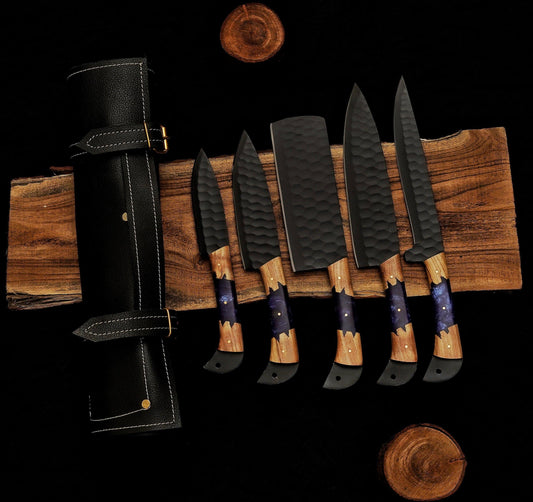
5 Piece Handmade Damascus Knives Chef Set, Kitchen knives set, Steel knife set with leather Sheath
Regular price $199.00 USDRegular priceUnit price / per$249.00 USDSale price $199.00 USDSale -
7 Piece Handmade Damascus Knives Chef Set, Kitchen knives set, Steel knife set with leather Sheath Custom Beautiful Handle
Regular price $289.00 USDRegular priceUnit price / per$349.00 USDSale price $289.00 USDSale -
7-Piece Hand-Made J2 Steel Knives Chef Set, Kitchen Knives Set, Steel Knife Set with Leather Sheath Custom Beautiful Handle
Regular price $289.00 USDRegular priceUnit price / per$399.00 USDSale price $289.00 USDSale
-
Decorative King Elessar Sword Replica, Fantasy Ranger Sword Prop, Decorative Collectible Blade for Display & Cosplay | Birthday Gift for Him
Regular price $299.00 USDRegular priceUnit price / per$399.00 USDSale price $299.00 USDSale -
Handmade Damascus daemon Sword | Daemon Steel Swords
Regular price $199.00 USDRegular priceUnit price / per$249.00 USDSale price $199.00 USDSale -
Handcrafted Viking Sword Of Kings, Ragnar Lothbrok Sword
Regular price $199.00 USDRegular priceUnit price / per$249.00 USDSale price $199.00 USDSale -
Handmade Witcher Sword | Damascus Stainless Steel Sword
Regular price $199.00 USDRegular priceUnit price / per$249.00 USDSale price $199.00 USDSale

